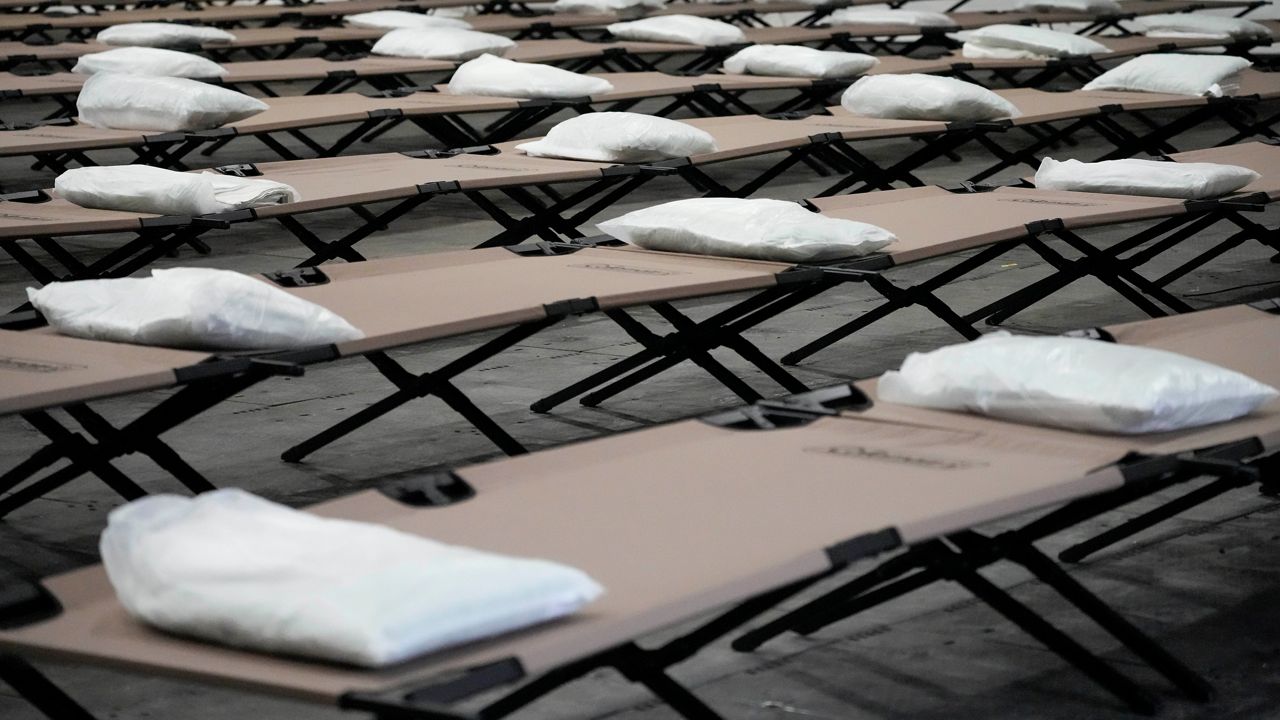The FDNY is launching a new round of fire safety inspections at city-run migrant shelters following reports of possible fire safety code violations – and considering shutting them down, NY1 has learned.
Inspectors on Thursday reviewed conditions at the former St. Mary Margaret church in Astoria, Queens turn migrant “respite center,” even though the location was not housing migrants, sources who spoke on condition of anonymity told NY1.
The department is on track to inspect several “respite centers” run by the city’s Department of Emergency Management, including shelters at the former St. Agnes Academic High School in College Point, Queens; the former St. John Villa Academy on Staten Island; and the Richard H. Hungerford school on Staten Island – as soon as this weekend, according to an internal list from the FDNY shared with NY1.
The FDNY’s inspection list includes migrant housing at a Touro College building in Midtown; the former site of the St. Brigid School in the East Village; and the massive tent structure providing beds to 1,000 adult men at the Creedmoor Psychiatric Center in Queens.
Sources provided a list sent by the FDNY to City Hall, notifying them which sites the department plans on inspecting over the next week and possibly issuing vacate orders to:
- Former St. John Villa Academy site – 25 Landis Ave., Staten Island – inspection slated for Sunday, Oct. 15
- Richard H. Hungerford School – 155 Tompkins Ave., Staten Island – Monday, Oct. 16
- 320 West 31st St., Manhattan – Tuesday, Oct. 17
- 481 Hylan Blvd., Staten Island – Wednesday, Oct. 18
- 746 Elton Ave., the Bronx – Thursday, Oct. 19
- Creedmoor Psychiatric Center – 80-45 Winchester Blvd., Queens – Friday, Oct. 20
- Former St. Brigid Elementary School site – 185 East 7th St., Manhattan – Saturday, Oct. 21
The FDNY is also inspecting locations overseen by the Department of Homeless Services.
The leases on several locations are slated to expire either at the end of the month or in early November, according to the city.
Sources say the FDNY conducted inspections at city-run migrant locations for several months following reports of migrants using hot plates in their rooms, leaving personal items in hotel hallways, and improper storage of battery operated e-bikes.
“This has been a known problem for several weeks and I’m glad the fire department is finally taking conclusive action. An infraction by the city should be the same by any hotel or building operator,” Republican Councilman Joe Borelli, who represents Staten Island, told NY1 after he was briefed on the changes.
City Hall hired additional security companies monitoring the concerns, the New York Post previously reported.
“The safety and security of all those in our care remains our top priority. Asylum seekers have undergone long and arduous journeys before their arrival in New York City, and we are committed to keeping them safe while they are staying at emergency shelters. We include the FDNY in all fire protection measures we undertake in our asylum seeker operations,” City Hall spokesperson Amaris Cockfield said in a statement.
But one source briefed on the change said should the FDNY move to close certain sites and evict residents, it could lead to migrants sleeping on city streets.
Migrants would have to go back through the city’s intake process beginning at the Roosevelt Hotel in Midtown and find additional placement.
The crackdown also comes as Mayor Eric Adams issued new orders limiting how long new adult migrant arrivals can stay in city-run locations to 30 days, down from 60 days.
He’s called on help from the federal and state government to help, as the city is struggling to find housing for thousands of new migrant arrivals in the city.
Since the spring of 2022, over 118,000 migrants have come to the city and upwards of 64,100 of them are living in 213 city-run sites across the five boroughs.
Adams just got back from a tour of Mexico, Central America, and South America, where he tried to persuade migrants not to come to New York City because there’s “no room” to house them as well as limited opportunities to work legally.
The mayor and Gov. Kathy Hochul are also seeking relief in the courts from the decades old right-to-shelter decree that requires the city to provide a bed to sleep in for individuals who request housing.



